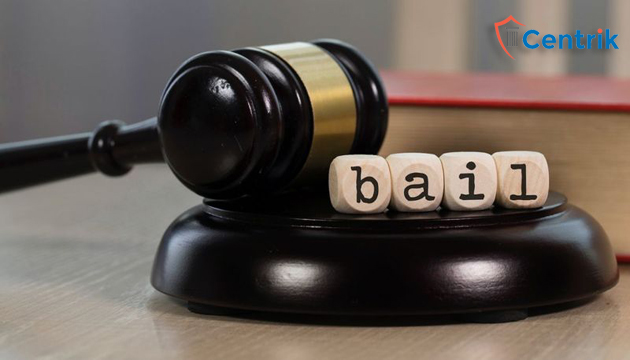
Statys as on- 24/05/2023
Section 438 of The Code of Criminal Procedure, 1973 has provisions regarding the bail to the person who has a fear of arrest in a non-bailable offense that he has not committed. The main object of such remedy is told by the 41st law commission report as sometimes the false implications are done on some persons to put them behind bars for some time to either defame them or to waste their most valuable time. The general term, ‘Anticipatory Bail‘ is used for any such bail.
PROCEDURE AS PER SECTION 438 CRPC
In accordance with Section 438 of the Criminal Procedure Code, bail must be provided before an arrest can be made.
A person may apply for bail before the session’s court of the High Court if they anticipate being detained for an offense for which there is no possibility of bail. In certain situations, the court looks at four factors in particular, and if it determines that the grounds are good and the fear is real, it may, at its discretion, issue an immediate interim order for the grant of anticipatory bail. The following grounds will be examined by the court:
- THE HEALTH OF THE ALLEGATION:
The courts determine whether the allegation is true, and if so, to what extent it is true. The strength of the accusation is evaluated by the court.
- WHETHER THE ACCUSED IS THE FIRST OFFENDER:
If the accused is understanding and the court sees the potential for reform as the society of the accused and those with an interest in him are also impacted by his imprisonment, the court will exercise flexibility in situations involving a first offense.
- IF THE ACCUSED IS REACHABLE
In numerous cases, the guilty is expected to get away with justice if released on bail. Bail for the apprehension of arrest is not permitted in any of these circumstances.
- THE HUMILIATION AND INJURY OF ACCUSED
Courts also consider an individual’s social reputation and offer a remedy if he is unjustly accused in any case in order to degrade and dishonor him in society. In accordance with the principle of Audi Alteram Partem, Section 1A provides the Public Prosecutors with a reasonable opportunity to be heard by giving them an instant notice of seven days after granting an interim order. Following the last hearing, the final order is made. Bail is granted by the court under specific restrictions. Following are the terms.
- The accused shall be ready to be called for interrogation.
- He shall not persuade anyone interested in the case not to disclose the facts.
- He shall not go abroad without permission.
- The other conditions of bail shall be followed as mentioned in section 437(3) CrPC.
Hence, If the accused is arrested, he shall be released on bail. This section doesn’t apply to offenses involving offenses against women. If a person is accused of committing rape or gang rape against a woman below 16 years of age [376(3) (Rape) and 376-DA (Gang Rape), IPC], below 12 years of age [376-AB (Rape) and 376-DB (Gang Rape), IPC].
CERTAIN CASES REGARDING SECTION 438 CRPC
- Vinod Kumar vs the State of UP: In this case, the Allahabad high court clarified certain ambiguities regarding section 438 CrPC (UP amendment 2018). The Hon’ble Court answered the question of which court shall be first approached to invoke remedy under sec 438 and held that it is not at all mandatory to go to trial court first. An applicant may come directly to the High Court, but only when “strong, cogent, compelling and special circumstances” exist. Here, the court also differentiated between Special and extraordinary circumstances. The period of anticipatory bail will be up to the summon issued by the court to him based on the report submitted by the police after the investigation (charge sheet).
- Prateek Jain Vs State of UP: Here the petitioner approached Allahabad High Court for Anticipatory Bail under Section 438 on the grounds of the apprehension of death due to the COVID-19 virus. The Hon’ble court allowed the anticipatory bail after finding sufficient special grounds as the arrest involves the risk of being infected by the virus. The court said that the right to life under Article 21 of the Constitution is paramount and an individual’s life is above the arrest under section 438. Even after the filing of the charge sheet, the arrest is protected due to the pandemic. The court, therefore, provided some guidelines to the petitioner and granted anticipatory bail.
CONCLUSION
An accused person is given bail to protect his rights since he is presumed innocent unless proven guilty. The right to live free of intimidation, fear, suspicion, and torture is guaranteed to all persons at birth. If a person is placed in detention, his family, which includes his parents, siblings, spouse, and children, suffers. A person is only placed behind bars when there is adequate cause and requirement. The family’s situation deteriorates if that person is the only one who earns a living. The right to freedom and life is strengthened by Section 438, which also guarantees the right to protection against detention.
Disclaimer: The above article is based on the personal interpretation of the related orders and laws. The readers are expected to take expert opinions before relying upon the article. For more information, please contact us at ibc@centrik.in.




 join For Updates
join For Updates